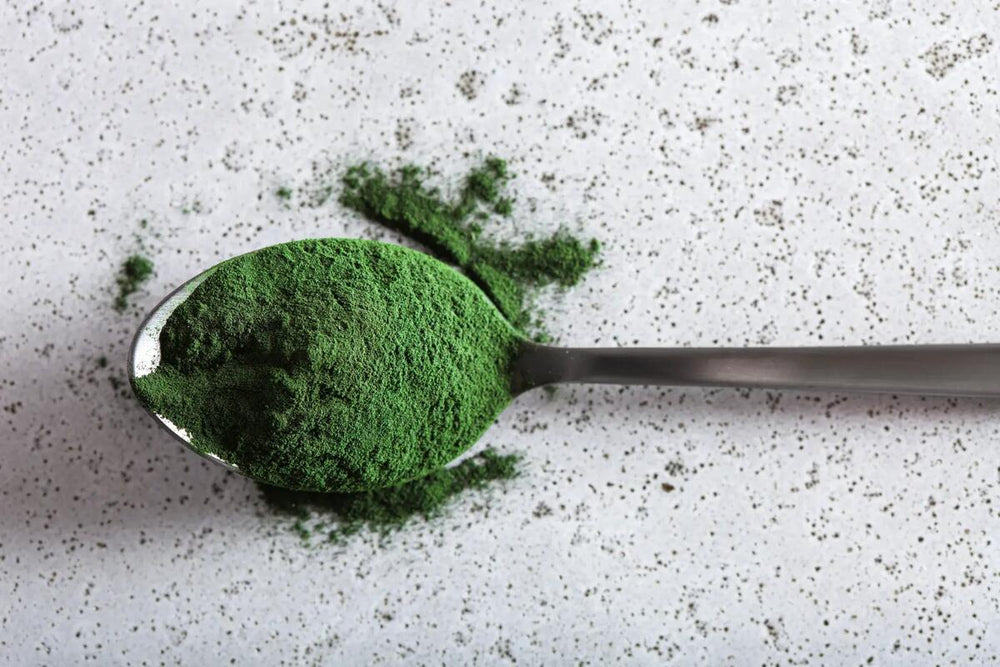By: Kayla Kowalski, Certified Canine Nutritionist
Spirulina – the almighty superfood!
When you think of a rich protein source does your brain picture a juicy steak or meaty chicken breast? Well, what about blue-green algae? Spirulina contains up to 70% highly digestible protein, making it the highest naturally occurring protein source per gram!
But what actually is spirulina? Belonging to a bacteria group known as cyanobacteria, spirulina is often recognized as an algae due to its vibrant green-blue color. Its pigment allows it to act like a plant, harvesting energy from the sun.
Spirulina is a widely recognized powerhouse of nutrients and has a lot to offer. Not only is it high in protein; it also provides a dense source of B vitamins, copper, iron, magnesium, zinc, antioxidants, as well as both amino and omega-3 fatty acids. The list goes on and on.

Is it okay for dogs to have spirulina?
Yes! Whether you are an avid user of spirulina supplements yourself or never heard of the superfood, adding it to your dog's diet can be life-changing. When sourced and used appropriately, spirulina can make a world of difference to your pet's health and vitality.
When looking at different brands to purchase, please be cautious around cheaper or less reputable products as they may contain fillers that do not provide any nutritional value. Spirulina relies on healthy photosynthesis for growth, so cutting corners with growing conditions may lower the quality of these products.
Please also be aware that spirulina grown in contaminated waters, or falsely advertised imitation products, can contain harmful levels of heavy metals or other toxins.
So, what's all the hype?
Spirulina offers a handful of benefits, including:
Strengthening the immune system
Your dog's immune system is its bodyguard against viruses, harmful bacteria, toxins, and foreign materials. A large portion of the immune system is composed of white blood cells (WBCs). These work to detect harmful substances and act as a first-line defense.
One of the ways in which spirulina works its magic is by increasing the speed these WBCs are produced. This means the body can respond faster to a threat of infection and ensure there’s plenty of backup available – much like a well-trained defense force.
When put to the test in a recent study, daily spirulina supplementation was also seen to increase the production of antibodies. This then resulted in a stronger immune response to vaccination, helping to improve protection for our healthy pups.

Alleviating allergies
Allergies in dogs are one of the most common concerns of pet parents, causing them to book vet visits. Alongside being troublesome to our pets, allergies are often very frustrating and expensive to control.
Spirulina helps keep your dog’s body from reacting negatively to a new allergen entering their system. This causes a reduced (or even absent) allergic response, alleviating the painful scratching of ears, inflamed eyes, or pesky chewing of paws.
Spirulina has also been seen to act as a natural antihistamine. This is especially powerful for those allergens which we can’t avoid contact with; such as dust, pollens, or even human skin cells.
I recommend adding a high-quality, balanced supplement, such as Native Pet’s Allergy Chews, to your dog’s diet daily. Their allergy chew not only contains spirulina, but it also contains colostrum and pre and probiotics, which provide a long list of benefits. The goal is to stop any allergy in its tracks before it has the chance to cause discomfort and frustration, and this supplement is perfect for this.
Improving gastrointestinal health
Good gut bacteria play a vital role in how your dog digests and absorbs nutrients from its diet.
Being more than just a gut feeling, spirulina has been shown to benefit gut bacteria and increase microbiome strength. This helps to preserve and grow the population of important bacteria, all whilst preventing the overgrowth of the bad bacteria.
To promote good gut health, consider adding Native Pet’s Probiotic to your dog’s meals daily.
Aiding in detoxification
Now, let's get to cleansing. The job of antioxidants is to mop up harmful free radicals and protect the body's cells from damage.
Alongside being rich in Vitamins A and C, spirulina also contains many antioxidants in the form of carotenoids, which are what give it its amazing color. Beta-carotene and phycocyanin are two of the most recognized.
This high density of antioxidants helps slow aging and cell damage that have the ability to progress to cancer (yikes!).
Reducing cancer development
Spirulina’s high concentration of antioxidants helps reduce inflammation and cell damage, both of which are involved with tumor development and growth.
Spirulina has also proven its value in the treatment of cancer through the stimulation of natural killer (NK) cells. Much like their name suggests, NK cells work to destroy virus-infected cells or cells under stress, such as those involved in cancer).

So, how do I add spirulina to my dog's diet?
Spirulina is very easy to introduce to your dog because of the earthy, slightly fishy taste. Dogs usually enjoy the taste and won’t mind the powder mixed directly into their meals.
However, if your pup is picky, you can try some of these suggestions:
- Hide the powder in healthy food such as pumpkin puree, goat’s milk, plain greek yogurt, cottage cheese, bone broth, or a homemade treat.
- Mix the spirulina powder with wet food alongside their normal meal.
- Purchase spirulina in a pressed tablet form and hide it in a bite-sized piece of meat.
If you’d like to learn more, I’m here to help
To learn more about supplementing your dog's diet, and balancing it for their own specific needs, go to KaylaKowalski.com.
Consider me your new dog nutritionist. My name is Kayla Kowalski and I’m a Certified Canine Nutritionist (CertCN). I’m here to help take your dog’s nutrition, and health, to the next level!


